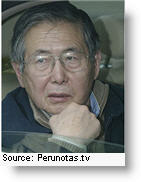 A government pardons commission report on the request filed for jailed former President Alberto Fujimori, may have been sent to the Justice Ministry, Premier Juan Jimenez said.
A government pardons commission report on the request filed for jailed former President Alberto Fujimori, may have been sent to the Justice Ministry, Premier Juan Jimenez said.
“I haven’t talked with the minister of Justice, but it is possible that yes, that they have received the report,” daily El Comercio reported Jimenez as saying.
Jimenez said that, therefore, a decision to grant or reject the pardon is in its “final phase.”
“I would ask for calm,” he said. “It is an important file, but it is also one of the millions of actions and activities that we have in the government and the state.”
“The appropriate decision will be made,” the premier added.
Fujimori, 74-years-old, was convicted in 2009 of human rights violations and corruption during his decade-long administration in the 1990s. Although he admitted to the corruption charges, he did not accept responsibility for the human rights violations. In a trial that was commended internationally for impeccable due process and procedure, the former president was sentenced to 25 years in prison.
Although Fujimori is serving his sentence in a large, comfortable and independent set of rooms at the police force’s special operations unit in east Lima, and despite fairly unrestricted visits, he has visibly aged and his health has deteriorated. He has no life-threatening illness, but he is suffering from depression. Psychiatrists on a state appointed medical panel disagree on its severity. His family says he should be released based on humanitarian grounds.
A recent poll by Datum found that about 60 percent of the population in Peru is in favor of granting the pardon.
Jurists argue, however, that a pardon would not only go against Peru’s commitment to the Inter-American Court of Human Rights but also Peruvian law, which does not permit pardons or reduced sentences for crimes against humanity.
The human rights crimes are two specific cases, perpetrated by the Colina death squad in 1991 with the knowledge of President Fujimori — the torture and murder of nine university students and a professor from the teacher’s college at La Cantuta, and the massacre of 15 people including a child, gunned down in a low-income housing courtyard in Barrios Altos during a fund-raising lunch said to be for the Shining Path. An additional case is the kidnapping of businessman Samuel Dyer and journalist Gustavo Gorriti in 1992, held in the military headquarters in San Borja. They were released unharmed, but Fujimori enacted a law during his administration prohibiting reduced prison sentences for perpetrators and planners of kidnappings.
According to Carlos Rivera, of the Legal Defense Institute, IDL, and one of the leading prosecutors in Alberto Fujimori’s seven trials, “An illegal and irregular pardon in favor of former President Alberto Fujimori, based on political considerations, would encourage requests for pardon by Shining Path founder Abimael Guzman and by Antauro Humala.” [President Humala’s brother was convicted and sentenced to 19 years in prison for leading an assault on a police station in Andahuaylas in 2005 that left four police and two civilians dead. The assault was a failed attempt to demand the resignation of President Alejandro Toledo.]
Jurists also suggest that pardoning President Fujimori would open the gates to pardon or at least reduced sentence requests from his military generals and cabinet ministers serving time for corruption.





